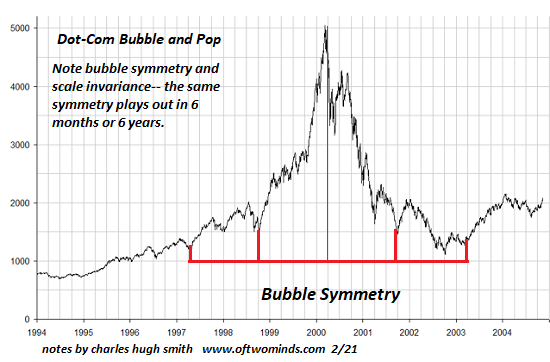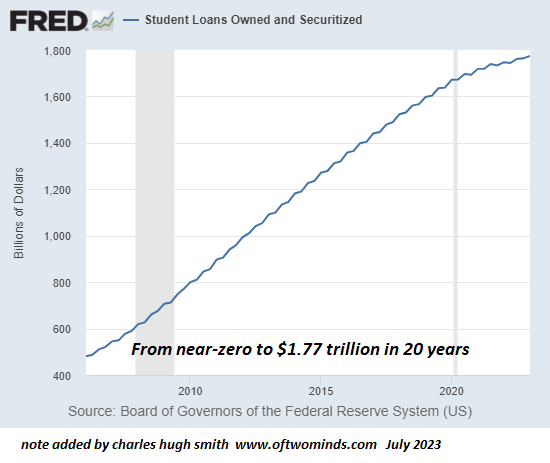All Bubbles Pop
The problem with bubbles of received wisdom and herd-euphoria is conditions change but the risk of something untoward happening is still perceived as inconsequentially low.
All bubbles pop--and not just stock market bubbles. A speculative bubble is a psychological-social phenomenon in which confidence in the stability of future gains reaches levels where doubts are banished and risks have dissipated into thin air. This confidence can be euphoric or it can be the baseline: this (guaranteed gains) is the way the world works.
This baseline confidence in the system is a form of received wisdom based on recency bias: since gains keep notching higher, the evidence supports expectations of future gains. Thus embracing what is clearly over-confidence (i.e. a bubble) is perceived as rational, and doubting future gains as irrational.
For example, the Higher Education Bubble is popping. The PR machinery that generated the confidence that borrowing immense fortunes to pay for university diplomas was a means to securing guaranteed lifetime gains is breaking down.
This confidence was not euphoric, it was received wisdom based on recency bias: study after study showed those with any flavor of four-year college degree earned far more over their lifetimes than those with only high school diplomas.
But beneath this apparently rock-solid evidence, the realities of debt, supply, demand and the changing nature of work and the economy were eroding the cost-benefit of borrowing fortunes to pay for college. As the percentage of the workforce with college diplomas rose, the scarcity value of degrees declined. The gap between the low level of actual productive skills gained in most college programs and the demands of employers for high levels of real skills widened.
With the money spigots of student debt gushing hundreds of billions of dollars into the higher education sector, universities had zero incentives to limit costs and every incentive to hire more administrators at ample salaries and construct fancy new buildings.
The risks generated by student debts also rose. The received wisdom held that borrowing $120,000 would automatically generate a financial return of many multiple of the total debt payments. But given that the accrued interest, penalties and late fees can double the initial sum borrowed, this drag on lifetime income becomes consequential when combined with the decay of marginal returns on having a college degree.
Now enrollments are plummeting, even in more affordable community colleges. The confidence in guaranteed gains from investing the time and money to get a diploma has been broken, and now bloated, ineffective (in terms of measurable productive skills learned by graduates) universities and colleges are facing declines in revenues that they are unprepared to manage.
5 Charts That Explain the Student Debt Crisis
The higher education bubble is not just a distortion of perceived risk and return; it's a financial bubble of massive debt, profiteering and mal-investment. Please glance at the chart below of student loan debt, which soared from near zero 20 years ago to $1.77 trillion in highly profitable, high-interest loans owned by the wealthy at the expense of credulous students.
Confidence in guaranteed future gains in the stock market is both received wisdom and a run-with-the-herd euphoria. Humans are social animals acutely attuned to the zeitgeist of the herd. There are strong incentives to join the herd and run with it, and the feeling of euphoria as the herd starts running is intense and gratifying.
Combine the recency bias generated by continual "saves" by the Federal Reserve since 2008 (and arguably from 1998) with the euphoria of the stampeding herd, and the result is a heady super-confidence that risk has dropped to "permanently low levels" while stocks have reached "what looks like a permanently high plateau."
The problem with bubbles of received wisdom and herd-euphoria is conditions change but the risk of something untoward happening is still perceived as inconsequentially low. Consider the South Seas Bubble. In the early days of globalization and colonial expansion, the opportunity created by the granting of a monopoly for all future profiteering in a vast undeveloped region of the world was obviously compelling. It was clearly a no-brainer to bet on gains.
Early investors were rewarded, and so were those who bought the dip. Even late-comers notched gains, and naysayers and skeptics were silenced by the monumental gains accrued by the herd.
Then the bubble popped, as all bubbles do, and the wealth vanished into the ether. Confidence has many sources, and recency bias and the herd are the most reliable and persuasive. The Internet will grow for decades, and so earnings can grow for decades. This received wisdom, goosed by Fed liquidity, generated a herd-euphoria in 1999 and 2000 that generated spectacular gains for everyone in the herd.
Then the herd went off the cliff, as herds tend to do when risk is perceived as inconsequentially low.


 My new book is now available at a 10% discount ($8.95 ebook, $18 print):
Self-Reliance in the 21st Century.
My new book is now available at a 10% discount ($8.95 ebook, $18 print):
Self-Reliance in the 21st Century.
Read the first chapter for free (PDF)
Read excerpts of all three chapters
Podcast with Richard Bonugli: Self Reliance in the 21st Century (43 min)
My recent books:
The Asian Heroine Who Seduced Me
(Novel) print $10.95,
Kindle $6.95
Read an excerpt for free (PDF)
When You Can't Go On: Burnout, Reckoning and Renewal
$18 print, $8.95 Kindle ebook;
audiobook
Read the first section for free (PDF)
Global Crisis, National Renewal: A (Revolutionary) Grand Strategy for the United States
(Kindle $9.95, print $24, audiobook)
Read Chapter One for free (PDF).
A Hacker's Teleology: Sharing the Wealth of Our Shrinking Planet
(Kindle $8.95, print $20,
audiobook $17.46)
Read the first section for free (PDF).
Will You Be Richer or Poorer?: Profit, Power, and AI in a Traumatized World
(Kindle $5, print $10, audiobook)
Read the first section for free (PDF).
The Adventures of the Consulting Philosopher: The Disappearance of Drake (Novel)
$4.95 Kindle, $10.95 print);
read the first chapters
for free (PDF)
Money and Work Unchained $6.95 Kindle, $15 print)
Read the first section for free
Become
a $1/month patron of my work via patreon.com.
Subscribe to my Substack for free
NOTE: Contributions/subscriptions are acknowledged in the order received. Your name and email remain confidential and will not be given to any other individual, company or agency.
|
Thank you, Angela B. ($5/month), for your marvelously generous pledge to this site -- I am greatly honored by your support and readership. |
Thank you, rmhoperenton ($5/month), for your splendidly generous Substack subscription to this site -- I am greatly honored by your support and readership. |


























